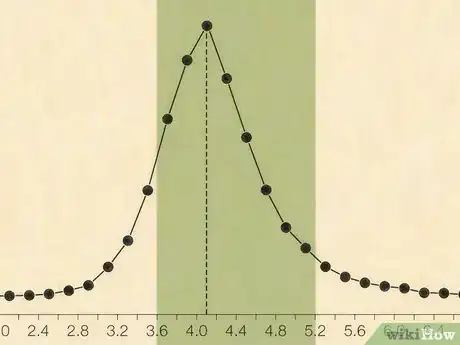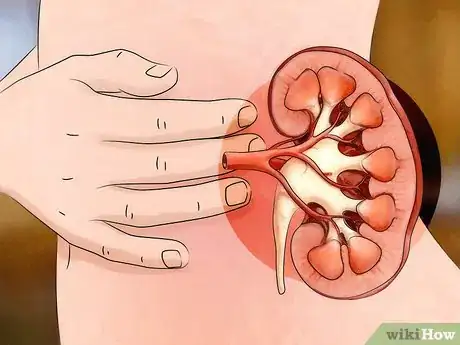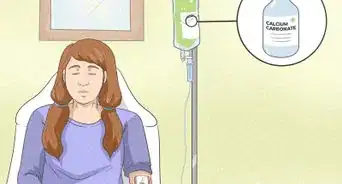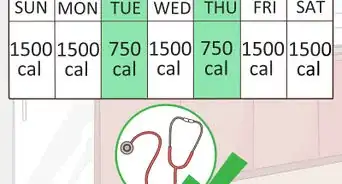This article was co-authored by Damaris Vega, MD. Dr. Damaris Vega is a board certified Endocrinologist. She graduated Magna Cum Laude from the Pontifical Catholic University of Puerto Rico with a BS in General Science and subsequently earned an MD from the Ponce School of Medicine, Ponce, PR. During medical school, Dr. Vega served as president of the Alpha Omega Alpha Medical Honor Society and was selected as her school's representative for the American Association of Medical Colleges. She then completed a residency in Internal Medicine and a fellowship in Endocrinology, Diabetes, Mineral, and Metabolism at The University of Texas Southwestern Medical School. Dr. Vega has been recognized for excellent patient care multiple times by the National Committee for Quality Assurance and received the Patients' Choice Award in 2008, 2009, and 2015. She is a fellow of the American College of Clinical Endocrinologists and is an active member of the American Association of Clinical Endocrinologists, the American Diabetes Association, and the Endocrine Society. Dr. Vega is also the founder and CEO of Houston Endocrinology Center as well as a principal investigator for multiple clinical trials at Juno Research, LLC.
There are 27 references cited in this article, which can be found at the bottom of the page.
wikiHow marks an article as reader-approved once it receives enough positive feedback. This article received 12 testimonials and 87% of readers who voted found it helpful, earning it our reader-approved status.
This article has been viewed 935,173 times.
Your potassium level affects your nerves and communication with muscle cells in the digestive system, heart and all other muscles. Most of the body’s potassium is inside cells and the potassium level in the bloodstream is normally maintained within a specific range by the endocrine system. Hypokalemia is a medical condition in which your potassium levels are low and decreases insulin sensitivity. People with hypokalemia will experience a variety of physical difficulties.[1]
Steps
Identifying the Signs
-
1Watch for early warning signs. The first signs of moderately low potassium can be muscle aches and cramps.[2] You may also experience abnormal weakness ((including respiratory and gastrointestinal muscle weakness if severe). Low potassium levels won’t allow neuromuscular cells to recharge quickly, which prevents them from firing repeatedly, meaning that muscles have difficulty contracting.[3]
- Faintness, muscle spasms, and muscle tingling or numbness can indicate worsening potassium deficiency and should be checked by a physician right away.[4]
-
2Get a diagnosis early. Extended or severe low potassium can affect the heart. Low potassium levels can cause change in its proper function. This can include irregular heartbeats, such as dangerous arrhythmia in severe cases.[5] Prolonged low potassium can cause structural and functional changes in the kidney.
- There is also excessive blood potassium, which is more dangerous: The symptoms of too much potassium when serious are heart palpitations, muscle pain, muscle weakness, or numbness, abnormal heart rate, possibly cardiac arrest and death. [6]
Advertisement -
3Be aware of circumstances that can lead to low potassium. If you are experiencing diarrhea, dehydration, vomiting, constipation, or weakness, then you may need to have your potassium levels tested.[7] This test involves having blood drawn and getting a basic metabolic panel of tests (BMP) including ones for electrolytes (which include sodium, potassium, calcium, magnesium, chloride, hydrogen phosphate, and hydrogen carbonate).[8]
- Depending upon your situation, your doctor may alternatively want you to have a comprehensive metabolic panel (CMP), which adds liver function tests to the basic panel.[9]
Getting Diagnosed
-
1Have your potassium level checked. A serum potassium level of less than 3.5 millimoles per liter (mmol/L) may be considered low; the normal range is 3.6-5.2 mmol/L)[10] Additional electrolyte levels such as calcium, glucose, magnesium and phosphorous may be checked at this time.
-
2Have an electrocardiogram (ECG or EKG). This will monitor the heart’s functioning for signs of damage or other problems. The doctor may have to shave parts of your skin if you have a lot of hair, and she will place 12 electrical leads on your arms, chest and legs. Each lead transmits electrical information about the heart to a monitor for 5 to 10 minutes. The patient should remain as still as possible and it may be necessary to repeat the ECG.[13]
Determining the Cause
-
1Talk to your doctor about diuretic usage. Use of diuretics can contribute directly to low potassium. Some patients with medical conditions such as high blood pressure may require diuretics for treatment. However, if these are leading to low potassium, you may need to talk to your doctor about an alternate medication.[16]
- Diuretics are a class of medication that includes furosemide and hydrochlorothiazide (HCTZ).[17] Diuretics attempt to relieve high blood pressure by increasing the urination rate.[18] However, this can cause minerals like potassium to be hard to maintain in balanced to the bodily needs, as they are excreted from the body in the urine.[19]
-
2Assess your lifestyle for potential causes. While some causes of low potassium are medical, some can be prevented by lifestyle changes. If you drink alcohol excessively,[20] use laxatives too frequently,[21] or constantly sweat profusely,[22] you could be causing your low potassium. Talk to a medical professional about changing these habits or altering your environment to assess the problem.
- You may need to seek treatment for alcohol addiction if you do not feel that you can drink less on your own.
- If you overuse laxatives, talk to your physician about how to reduce your reliance on them through natural methods.
- If you sweat profusely, you may need to change your work or living environment. Keeping cooler, staying hydrated, or taking medical steps to sweat less may be necessary.
- Other conditions that can lead to low potassium include chronic kidney disease, diabetic ketoacidosis, diarrhea, aldosteronism, hyperaldosteronism, and antibiotic use.[23]
-
3Get tested for other medical conditions. Low potassium can be an indicator of other serious medical conditions. Chronic kidney disease[24] and diabetic ketoacidosis[25] can lead to low potassium and should be addressed immediately. Additional conditions that may lead to low potassium are a folic acid deficiency or stomach ailments that cause persistent vomiting or diarrhea.[26] [27]
- Hyperaldosteronism leads to a syndrome that includes hypertension and hypokalemia.[28]
-
4Adjust your diet. The best way to increase your potassium level is by eating potassium-rich foods. You can also take a potassium supplement, but be sure to talk to your doctor so that you do not overload on too much potassium. Some potassium-rich foods include:[29]
- Bananas
- Avocados
- Tomatoes
- Potatoes
- Spinach
- Beans and Peas
- Dried fruits
Expert Q&A
Did you know you can get expert answers for this article?
Unlock expert answers by supporting wikiHow
-
QuestionHow can you tell if you have low potassium levels?
 Damaris Vega, MDDr. Damaris Vega is a board certified Endocrinologist. She graduated Magna Cum Laude from the Pontifical Catholic University of Puerto Rico with a BS in General Science and subsequently earned an MD from the Ponce School of Medicine, Ponce, PR. During medical school, Dr. Vega served as president of the Alpha Omega Alpha Medical Honor Society and was selected as her school's representative for the American Association of Medical Colleges. She then completed a residency in Internal Medicine and a fellowship in Endocrinology, Diabetes, Mineral, and Metabolism at The University of Texas Southwestern Medical School. Dr. Vega has been recognized for excellent patient care multiple times by the National Committee for Quality Assurance and received the Patients' Choice Award in 2008, 2009, and 2015. She is a fellow of the American College of Clinical Endocrinologists and is an active member of the American Association of Clinical Endocrinologists, the American Diabetes Association, and the Endocrine Society. Dr. Vega is also the founder and CEO of Houston Endocrinology Center as well as a principal investigator for multiple clinical trials at Juno Research, LLC.
Damaris Vega, MDDr. Damaris Vega is a board certified Endocrinologist. She graduated Magna Cum Laude from the Pontifical Catholic University of Puerto Rico with a BS in General Science and subsequently earned an MD from the Ponce School of Medicine, Ponce, PR. During medical school, Dr. Vega served as president of the Alpha Omega Alpha Medical Honor Society and was selected as her school's representative for the American Association of Medical Colleges. She then completed a residency in Internal Medicine and a fellowship in Endocrinology, Diabetes, Mineral, and Metabolism at The University of Texas Southwestern Medical School. Dr. Vega has been recognized for excellent patient care multiple times by the National Committee for Quality Assurance and received the Patients' Choice Award in 2008, 2009, and 2015. She is a fellow of the American College of Clinical Endocrinologists and is an active member of the American Association of Clinical Endocrinologists, the American Diabetes Association, and the Endocrine Society. Dr. Vega is also the founder and CEO of Houston Endocrinology Center as well as a principal investigator for multiple clinical trials at Juno Research, LLC.
Board Certified Endocrinologist
-
QuestionI'm feeling a burning sensation over my left breast. Can that be from low potassium? I take a diuretic daily.
 Chris M. Matsko, MDDr. Chris M. Matsko is a retired physician based in Pittsburgh, Pennsylvania. With over 25 years of medical research experience, Dr. Matsko was awarded the Pittsburgh Cornell University Leadership Award for Excellence. He holds a BS in Nutritional Science from Cornell University and an MD from the Temple University School of Medicine in 2007. Dr. Matsko earned a Research Writing Certification from the American Medical Writers Association (AMWA) in 2016 and a Medical Writing & Editing Certification from the University of Chicago in 2017.
Chris M. Matsko, MDDr. Chris M. Matsko is a retired physician based in Pittsburgh, Pennsylvania. With over 25 years of medical research experience, Dr. Matsko was awarded the Pittsburgh Cornell University Leadership Award for Excellence. He holds a BS in Nutritional Science from Cornell University and an MD from the Temple University School of Medicine in 2007. Dr. Matsko earned a Research Writing Certification from the American Medical Writers Association (AMWA) in 2016 and a Medical Writing & Editing Certification from the University of Chicago in 2017.
Family Medicine Physician
-
QuestionI'm feeling dizzy. Is this due to low potassium?
 Chris M. Matsko, MDDr. Chris M. Matsko is a retired physician based in Pittsburgh, Pennsylvania. With over 25 years of medical research experience, Dr. Matsko was awarded the Pittsburgh Cornell University Leadership Award for Excellence. He holds a BS in Nutritional Science from Cornell University and an MD from the Temple University School of Medicine in 2007. Dr. Matsko earned a Research Writing Certification from the American Medical Writers Association (AMWA) in 2016 and a Medical Writing & Editing Certification from the University of Chicago in 2017.
Chris M. Matsko, MDDr. Chris M. Matsko is a retired physician based in Pittsburgh, Pennsylvania. With over 25 years of medical research experience, Dr. Matsko was awarded the Pittsburgh Cornell University Leadership Award for Excellence. He holds a BS in Nutritional Science from Cornell University and an MD from the Temple University School of Medicine in 2007. Dr. Matsko earned a Research Writing Certification from the American Medical Writers Association (AMWA) in 2016 and a Medical Writing & Editing Certification from the University of Chicago in 2017.
Family Medicine Physician
References
- ↑ https://my.clevelandclinic.org/health/diseases/17740-low-potassium-levels-in-your-blood-hypokalemia
- ↑ Damaris Vega, MD. Board Certified Endocrinologist. Expert Interview. 7 October 2020.
- ↑ https://medlineplus.gov/genetics/condition/hypokalemic-periodic-paralysis/
- ↑ http://www.nlm.nih.gov/medlineplus/ency/article/000479.htm#Symptoms
- ↑ Damaris Vega, MD. Board Certified Endocrinologist. Expert Interview. 7 October 2020.
- ↑ https://www.ncbi.nlm.nih.gov/pmc/articles/PMC3061004/
- ↑ https://www.physio-pedia.com/Hypokalemia
- ↑ https://www.urmc.rochester.edu/encyclopedia/content.aspx?contenttypeid=167&contentid=basic_metabolic_panel_blood
- ↑ https://medlineplus.gov/lab-tests/comprehensive-metabolic-panel-cmp/
- ↑ https://my.clevelandclinic.org/health/diseases/15184-hyperkalemia-high-blood-potassium
- ↑ https://my.clevelandclinic.org/health/diagnostics/17684-blood-urea-nitrogen-bun-test
- ↑ https://pubmed.ncbi.nlm.nih.gov/6942643/
- ↑ https://www.heart.org/en/health-topics/heart-attack/diagnosing-a-heart-attack/electrocardiogram-ecg-or-ekg
- ↑ http://www.ncbi.nlm.nih.gov/pubmed/17804670
- ↑ http://www.ncbi.nlm.nih.gov/pubmed/3087320
- ↑ https://www.health.harvard.edu/heart-health/low-potassium-levels-from-diuretics
- ↑ https://pubmed.ncbi.nlm.nih.gov/22235821/
- ↑ https://www.health.harvard.edu/heart-health/tips-for-taking-diuretic-medications
- ↑ https://rarediseases.org/rare-diseases/hypokalemia/
- ↑ https://www.tandfonline.com/doi/full/10.1080/20009666.2018.1514943
- ↑ https://www.uofazcenteronaging.com/care-sheet/providers/medication-induced-hypokalemia-common-problem
- ↑ https://rarediseases.org/rare-diseases/hypokalemia/
- ↑ https://www.physio-pedia.com/Hypokalemia
- ↑ https://www.davita.com/diet-nutrition/articles/basics/potassium-and-chronic-kidney-disease
- ↑ https://emedicine.medscape.com/article/118361-treatment
- ↑ https://pubmed.ncbi.nlm.nih.gov/26056461/
- ↑ https://rarediseases.org/rare-diseases/hypokalemia/
- ↑ https://www.ncbi.nlm.nih.gov/books/NBK499983/
- ↑ https://ods.od.nih.gov/factsheets/Potassium-HealthProfessional/
- ↑ https://my.clevelandclinic.org/health/diseases/17740-low-potassium-levels-in-your-blood-hypokalemia
- ↑ https://www.mayoclinic.org/drugs-supplements/potassium-supplement-oral-route-parenteral-route/proper-use/drg-20070753
- ↑ https://www.aafp.org/pubs/afp/issues/1999/0801/p455.html
About This Article
To recognize the symptoms of low potassium, look for muscle aches and cramps, which may indicate moderately low potassium levels. If you feel tingling or numbness in your muscles, get checked out by a doctor right away, since these are possible signs of serious potassium deficiency. You may also have low potassium levels if you’re experiencing conditions, like vomiting and diarrhea, which can lead to low potassium levels. Additionally, consider having your potassium levels checked if you’re dehydrated, or feeling faint or unusually weak. For tips from our Medical co-author on how to get your blood tested for low potassium levels, read on!

















-Step-12-Version-2.webp)





















































Medical Disclaimer
The content of this article is not intended to be a substitute for professional medical advice, examination, diagnosis, or treatment. You should always contact your doctor or other qualified healthcare professional before starting, changing, or stopping any kind of health treatment.
Read More...